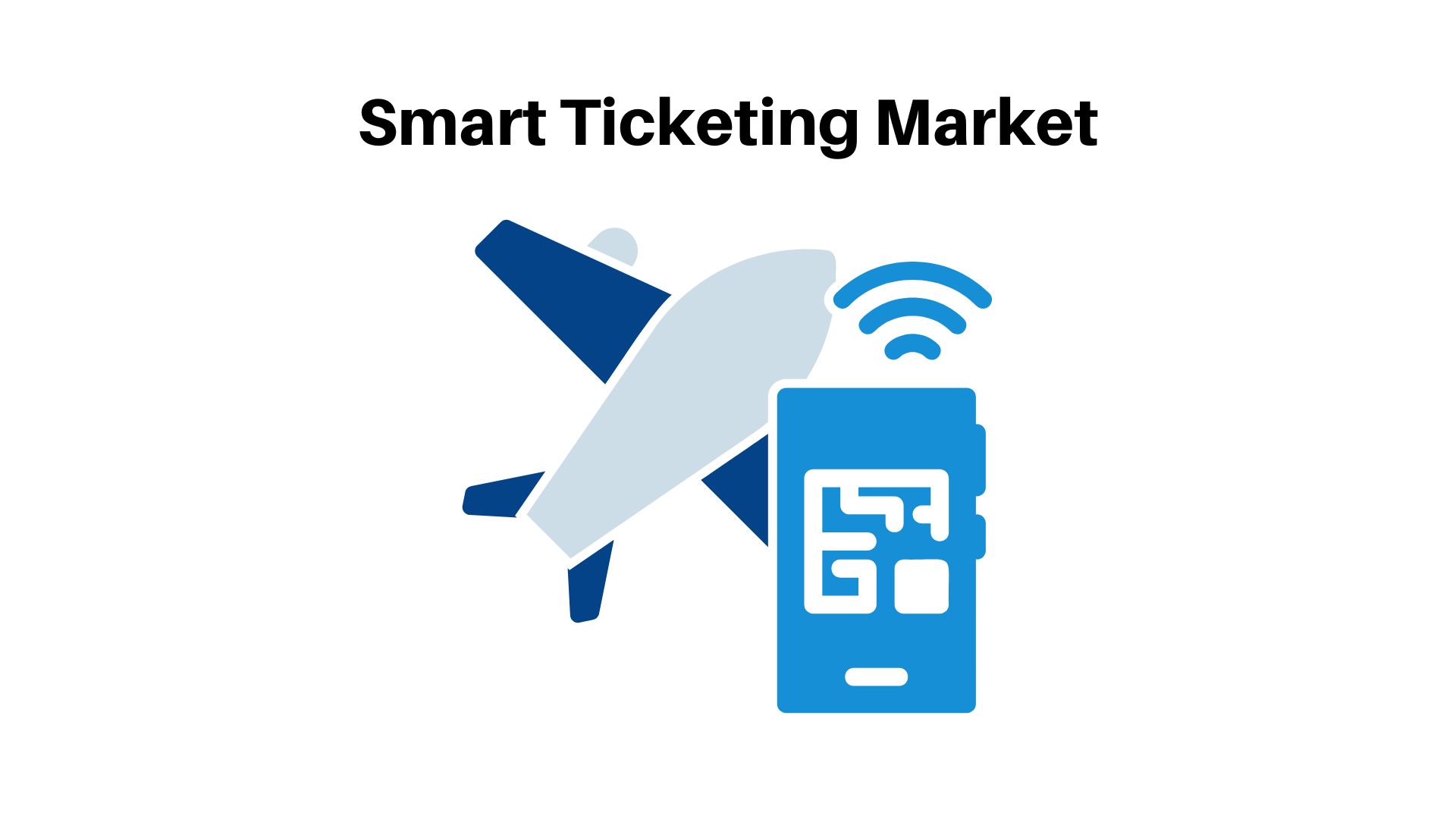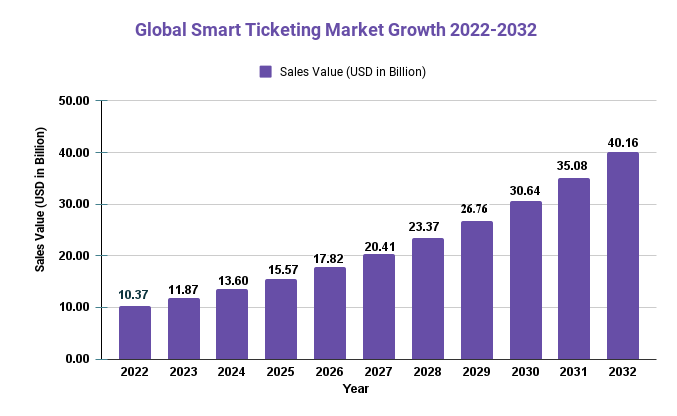Smart Ticketing Market to Grow at a CAGR of 14.5% from 2022 to 2032, with an Initial Value 10.37

Page Contents
Market Overview
Published Via 11Press: The Smart Ticketing market size is projected to expand significantly over the coming years, driven by rising demand for digital ticketing solutions and an expanding acceptance of contactless payments.
According to Market.us' report, the global Smart Ticketing market size is forecast to reach USD 40.16 billion by 2032, growing at an annual compound growth rate (CAGR) of 14.5% from 2022-2032.
The transportation segment is expected to dominate the Smart Ticketing market, due to the rising demand for contactless ticketing solutions in public transport systems. Sports and entertainment also show significant growth potential due to the increasing adoption of digital ticketing solutions within this industry.
Geographically, the Smart Ticketing market is divided into North America, Europe, Asia Pacific, and the Rest of the World. Asia Pacific is expected to hold the largest share in this space due to increasing investments in smart city projects and the growing adoption of digital payment solutions there. Europe and North America are also expected to experience significant growth due to the growing demand for digital ticketing solutions within transportation systems.
We Have Recent Updates on the Market in Sample Copy@ https://market.us/report/smart-ticketing-market/request-sample

Regional Snapshot
- The smart ticketing market is experiencing rapid growth due to the increasing adoption of intelligent transportation systems around the world. Geographically, this market can be divided into North America, Europe, Asia-Pacific, and other major regions.
- North America is the leading market for smart ticketing, due to its well-established transportation infrastructure and high adoption of advanced technologies. The rising demand for contactless payment systems coupled with an expanding list of smart city initiatives are expected to fuel growth in this sector.
- Europe is the second-largest market for smart ticketing and is projected to experience significant growth over the coming years. The European Union has actively promoted smart ticketing systems in an effort to enhance public transport efficiency, reduce congestion, and reduce carbon emissions. Furthermore, open-loop payment systems and mobile ticketing solutions are expected to further fuel growth within this space in Europe.
- The Asia-Pacific region is anticipated to experience rapid growth in the market for smart ticketing, due to increasing investments in smart transportation systems and the rising adoption of digital payment methods. Countries such as China and India boast large populations and rapid urbanization that will fuel demand for these solutions within this region.
- In the rest of the world, the Middle East and Africa are expected to experience significant growth in the smart ticketing market due to increasing investments in transportation infrastructure and the adoption of advanced technologies. Latin America also presents promising growth prospects for this market due to government initiatives promoting digital payments and smart transportation systems.
Drivers
- With the ongoing COVID-19 pandemic, there has been an uptick in demand for contactless payment systems to reduce virus transmission risk. Smart ticketing solutions offer passengers a secure and convenient way to pay their transport fares without needing physical contact with ticket machines or agents.
- Smart ticketing: Smart ticketing is an integral component of smart transportation systems, which are becoming more widely adopted around the world to enhance public transport efficiency, reduce congestion, and lower carbon emissions. This has created a major demand for advanced ticketing solutions.
- Government initiatives to Promote Digital Payments: Governments around the world are actively encouraging their citizens to switch over to digital payments in an effort to reduce cash usage and enhance financial efficiency. Smart ticketing solutions play a significant role in this movement, offering passengers a secure and convenient way to pay for transport fares with digital methods.
- Rising Adoption of Mobile Ticketing Solutions: As smartphone and mobile internet penetration continue to rise, more passengers are turning to mobile ticketing services to purchase and validate their transport tickets. Smart ticketing systems that include mobile ticketing capabilities are well-positioned to benefit from this trend.
- Growing Demand for Secure and Efficient Ticketing Systems: Traditional ticketing methods, which rely on paper tickets and magnetic stripe cards, are vulnerable to fraudulence or security breaches. Smart ticketing solutions provide a more secure and efficient way of managing transport fares, decreasing the risk of revenue loss while increasing passenger confidence in the transportation system.
Restraints
- High Implementation Costs: Implementing smart ticketing systems requires substantial capital investment, which may pose a major obstacle for smaller transport operators or those with tight budgets. Furthermore, upgrading existing infrastructure and training personnel on how to use the new system adds to overall implementation expenses.
- Limited Infrastructure and Connectivity in Some Regions: Lack of adequate transportation infrastructure and connectivity can be a major barrier to the implementation of smart ticketing systems, particularly in rural or remote locations. This limits their reach and makes it harder for passengers to access and utilize these solutions.
- Resistance to Change: Traditional ticketing systems have been around for some time, and some passengers may feel uneasy about making the transition from paper-based or cash-based systems. This could slow down the adoption of smart ticketing solutions and limit their market potential.
- Technical Issues and Interoperability Challenges: Smart ticketing systems involve complex technology, making interoperability between different systems a major challenge. This could create technical problems like ticketing errors that cause passenger dissatisfaction and revenue loss.
- Data Privacy and Security Issues: Smart ticketing systems involve the collection and processing of sensitive passenger data, such as personal details and travel patterns. This poses concerns about data privacy and security; transport operators may need to take measures to protect passengers' identities while complying with relevant regulations.
Opportunities
- Adoption of cloud-based ticketing systems: Cloud-based ticketing offers significant potential for the smart ticketing market. These solutions are scalable, adaptable, and cost-effective to use, making them ideal for transport operators of all sizes to access from any device with an internet connection.
- Integration with Other Smart City Initiatives: Smart ticketing systems can be integrated with other smart cities initiatives such as traffic management systems, parking systems, and public safety systems. This integration may open up new prospects for the smart ticketing market such as developing integrated transport solutions that enable passengers to plan and pay for their journeys across various modes of transport.
- Advancements in Technology: The rapid advances in technology, such as 5G networks, Internet of Things devices, and artificial intelligence (AI), provide significant opportunities for the smart ticketing market. These innovations can be utilized to enhance functionality and security within smart ticketing systems, improve passenger experience and reduce operational costs.
- Open-loop Payment Systems are growing in popularity: Open-loop systems allow passengers to use their contactless payments cards or mobile payment app to pay for their transportation fares. This trend opens up significant opportunities in the smart ticketing industry since operators of transport can take advantage of existing payment infrastructures to offer passengers a more convenient and seamless payment experience.
- Growth in urbanization and smart cities initiatives: The smart ticketing market is poised for significant growth due to both the continued growth of urbanization worldwide and the growing adoption of smart city projects around the globe. Smart ticketing solutions are becoming more important for efficient and convenient transport systems as more people move to cities.
View Detailed TOC of the Report | https://market.us/report/smart-ticketing-market/table-of-content/
Challenges
- Interoperability issues: It can be difficult to interoperate between smart ticketing systems. Different systems may be used by transport operators, which could cause problems for passengers who might need separate tickets for each mode. This could lead to dissatisfaction among passengers and decrease the appeal of smart ticketing.
- Security concerns: Smart ticketing systems store and process sensitive passenger information, including travel patterns and personal information. Security and privacy concerns can be raised by this. Transport operators must ensure that smart ticketing systems comply with applicable regulations and are secure to protect passengers' data.
- Technical issues: Smart ticketing systems are dependent on complex technology. This can lead to technical issues like ticketing errors and system malfunctions. These issues can cause dissatisfaction among passengers and revenue loss to transport operators.
- Adoption Challenges: Smart ticketing systems may face adoption difficulties from both transport operators and passengers alike. Some may be resistant to change and prefer traditional ticketing methods; similarly, some passengers may feel uneasy using modern technology and opt for traditional paper-based or cash-based ticketing options instead.
- Funding Challenges: Implementing smart ticketing systems may necessitate significant capital investment, which could pose a major obstacle for smaller transport operators or those with tight budgets. Furthermore, government support for such projects may be limited or unpredictable.
Key Market Segments
Type
- Ticket Machine
- E-Ticket
- E-Kiosk
Application
- Railways and Metros
- Sports and Entertainments
- Buses
- Airlines
- Other
Key Market Players
- HID (U.S.)
- Gemalto NV (Netherlands)
- NXP Semiconductors (U.S.)
- CPI Card Group (U.S.)
- Cubic (U.S.)
- Xerox (U.S.)
Report Scope
| Report Attribute | Details |
| The market size value in 2022 | USD 10.37 Bn |
| Revenue forecast by 2032 | USD 40.16 Bn |
| Growth Rate | CAGR Of 14.5% |
| Regions Covered | North America, Europe, Asia Pacific, Latin America, and Middle East & Africa, and Rest of the World |
| Historical Years | 2017-2022 |
| Base Year | 2022 |
| Estimated Year | 2023 |
| Short-Term Projection Year | 2028 |
| Long-Term Projected Year | 2032 |
Frequently Asked Question
Q: What is the current market size for the Smart Ticketing Market?
A: According to a report by Market.us, the Smart Ticketing Market was valued at USD 10.37 billion in 2022 and is expected to reach USD 40.16 billion by 2032, growing at a CAGR of 14.5% during the forecast period.
Q: What are the key segments of the Smart Ticketing Market?
A: The Smart Ticketing Market can be segmented based on Type (Ticket Machine, E-Ticket, E-Kiosk), By Application (Railways and Metros, Sports and Entertainments, Buses, Airlines, Other), and geography (North America, Europe, Asia-Pacific, Latin America, and Middle East & Africa).
Q: Who are the key players in the Smart Ticketing Market?
A: Some of the key players in the Smart Ticketing Market include HID (U.S.), Gemalto NV (Netherlands), NXP Semiconductors (U.S.), CPI Card Group (U.S.), Cubic (U.S.), Xerox (U.S.).
The team behind market.us, marketresearch.biz, market.biz and more. Our purpose is to keep our customers ahead of the game with regard to the markets. They may fluctuate up or down, but we will help you to stay ahead of the curve in these market fluctuations. Our consistent growth and ability to deliver in-depth analyses and market insight has engaged genuine market players. They have faith in us to offer the data and information they require to make balanced and decisive marketing decisions.



